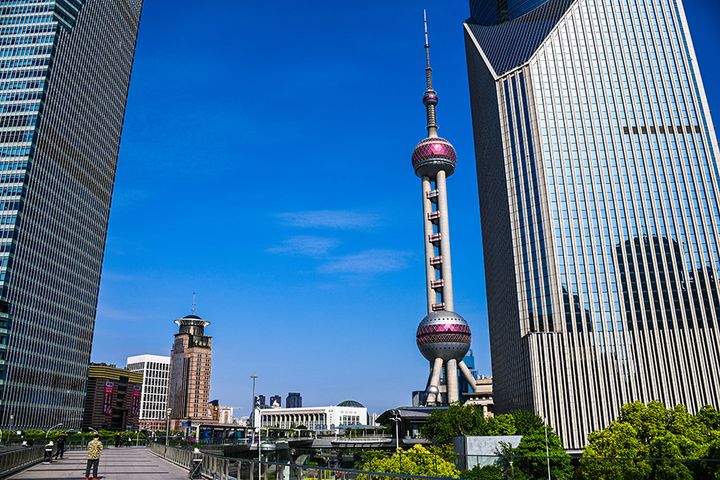 Culture Hoists Shanghai to Top of China's Business Environment Index
Culture Hoists Shanghai to Top of China's Business Environment Index(Yicai Global) May 16 -- Shanghai tops the national business environment index, followed by Beijing, Shenzhen and Guangzhou, the latest study to compare Chinese cities' business allure shows.
A report, jointly issued by the China Strategic Culture Promotion Association, the Economic Media Association of China, the Wanbo New Economy Research Institute and Yicai Research Institute on May 11, assessed and researched the business environments in China's top 100 cities based on gross domestic production and an array of other factors.
The business environment index comprises both hardware and software. The former includes the sub indicators of the natural and infrastructure environments, while the latter consists of the technical innovation, talent, financial, cultural and living elements.
Shanghai ranks second in both the soft and hard indexes. The city was among the top three for five sub-indicators, including the infrastructure, talent, technical innovation, cultural and financial areas, but the eastern Chinese metropolis ranked first in infrastructure and culture.
The natural factors of air quality, climate and ecology and forest coverage relegated Beijing to a lower rung on the hard ladder, though it stands above the rest on the soft one with its significant edges in talent and finance, in both of which categories China's capital tops the list.
Placing third in the business index, Shenzhen, which heads the country in the soft technical innovation environment, also comes out top dog in the hard arena. In the talent area, great space for improvement lies latent in the many local universities and their graduates.
Shanghai is more competitive than the other two cities because of its comprehensive strength. The eastern financial hub and port city "exceeds others in its cultural tableau because it has an open spirit receptive to novelty," the report noted.
Shanghai ranks first in the infrastructure and cultural environments and is among the top three in the talent, technical innovation and financial fields. The cultural milieu, which has become a closely-watched metric, has now become a must-have in improving a city's business appeal.
Cultural soft-power significantly impacts business environment, even as cities focus mainly on finance, talent and technology, the report noted. Innovative firms consider more whether a city has a free and open cultural scene when selecting the home for their office, even over and above its geographical location, infrastructure and favorable tax and land policies. In addition to the natural environment and social security polices relating to household registration and housing, innovative talent also weighs whether a city has a good cultural and communications atmosphere when choosing where to settle.
Competitive neutrality has also emerged as a new benchmark for business attractiveness, said experts attending the press briefing for the report's release. Rule of law and internationalization are also critical factors.
The principle of competitive neutrality, which does not apply to non-profit and non-commercial activities, requires tax and lending neutrality, certain rates of return, regulatory non-bias and full-cost pricing. This means that the government, as the custodian of the public sector, cannot exploit its legislative or financial power to gain a complete competitive advantage over rivals in major private sector business activities.
Optimizing the business environment should no longer rely on conventional development paths or models but instead defer to the principle of competitive neutrality and internationalization, Ge Dongbo, the director of the small and medium enterprise office at Shanghai's Commission of Economy and Informatization, said at the seminar.
Competitive neutrality means that central enterprises, local state-backed firms, foreign-funded companies and private businesses jointly drive Shanghai's economy, Ge stated, adding its diminutive space means the city cannot possibly figure prominently in the global market without internationalizing its business terrain and actively engaging in a new round of international economic competition.
Rule of law is fundamental to a stable, transparent, fair and predictable business playing field, and innovation is a key indicator of the sustainable development of a good business environment, said Wu Sikang, director of the Shenzhen government's development research center.
Shenzhen pays special heed to establishing the rule of law and an administration on that basis, bolstering the protection of intellectual property and further standardizing the company law enforcement system, Wu said.
The southern megacity home to over 10,000 high-tech businesses is quite an active incubator of innovation, having come up with half of the numerous technical innovations that China contributed to the fifth-generation wireless network technology.
Editor: Ben Armour